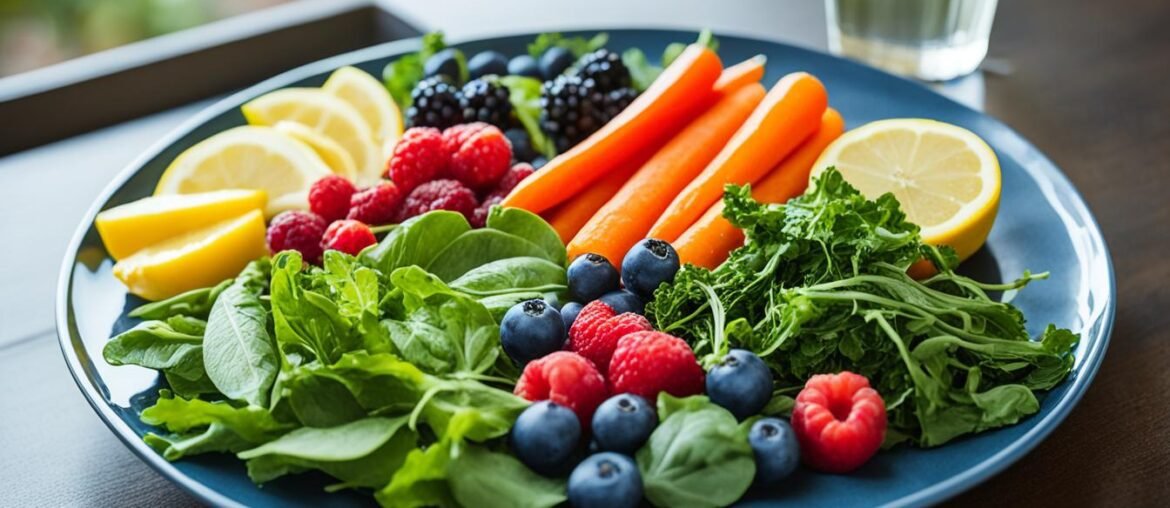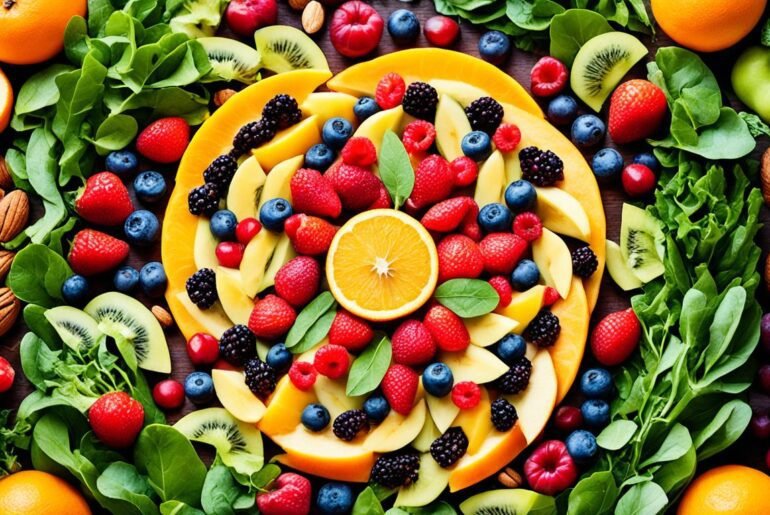Did you know that what you eat can have a direct impact on the health and appearance of your skin? It’s true! Your diet plays a crucial role in nourishing your skin from within and promoting a clear, glowing complexion.
When it comes to achieving healthy skin, it’s not just about using the right skincare products. Incorporating skin-friendly foods into your daily meals can make a significant difference in improving your skin’s overall health and vitality.
Whether you’re looking to address common skincare concerns, maintain a clear complexion, or simply enhance your skin’s radiance, following a diet for healthy skin is key. By fueling your body with the right nutrients, you can support optimal skin health and unleash your natural beauty.
Key Takeaways:
- What you eat directly impacts the health and appearance of your skin.
- A diet rich in skin-friendly foods promotes clear and radiant skin.
- Nutrients such as vitamins, minerals, antioxidants, and fatty acids play a crucial role in maintaining healthy skin.
- Incorporating fruits, vegetables, healthy fats, and staying hydrated are essential for nourishing your skin from within.
- Proper nutrition is not only important for external beauty but also for overall health and well-being.
The Importance of a Healthy Skin Diet
Our diet plays a critical role in maintaining healthy skin. The foods we eat provide the necessary nutrients and antioxidants that support skin health and protect against damage. A healthy skin diet can help improve the appearance of the skin, prevent skin problems, and delay aging effects. On the contrary, a poor diet lacking in essential nutrients can result in various skin issues such as dryness, acne, inflammation, and early signs of aging. It is important to pay attention to balanced nutrition and incorporate skin-friendly foods into our daily meals to promote optimal skin health.
The Benefits of a Healthy Diet for Skin
Eating well is not only important for our overall health, but it also has numerous benefits for our skin. A healthy diet provides the necessary vitamins, minerals, and antioxidants that support skin health and contribute to a clear and radiant complexion. Here are some key benefits of a healthy skin diet:
- Promotes skin cell regeneration and repair
- Enhances collagen production for firm and youthful-looking skin
- Helps maintain skin elasticity for a supple and smooth texture
- Reduces inflammation and calms skin conditions such as acne and eczema
- Protects against UV damage and oxidative stress
- Delays the signs of aging, such as wrinkles and fine lines
By prioritizing a healthy diet, we can nourish our skin from within and maintain its health and beauty.
The Impact of Nutrition on Skin Health
What we eat directly affects the health and appearance of our skin. When we consume a balanced diet rich in vitamins, minerals, antioxidants, and essential fatty acids, we provide our skin with the necessary building blocks to function optimally. These nutrients support various processes in the skin, such as collagen synthesis, cell turnover, and hydration. On the other hand, a diet high in processed foods, sugar, and unhealthy fats can contribute to skin problems such as acne, inflammation, and premature aging.
Research has shown that certain nutrients have a direct impact on skin health:
| Nutrient | Sources | Role in Skin Health |
|---|---|---|
| Vitamin C | Citrus fruits, berries, leafy greens | Collagen synthesis, antioxidant protection |
| Vitamin E | Nuts, seeds, spinach, broccoli | Antioxidant protection, moisturizing |
| Omega-3 fatty acids | Fatty fish, flaxseeds, walnuts | Anti-inflammatory, moisturizing, protective |
| Zinc | Oysters, pumpkin seeds, beef | Wound healing, oil control, acne prevention |
As you can see, a balanced diet that includes a variety of nutrient-dense foods is essential for maintaining healthy skin.
Remember: The food we consume can either nourish or harm our skin. By making conscious choices and prioritizing a healthy skin diet, we can enjoy the benefits of radiant and youthful-looking skin.
Key Nutrients for Healthy Skin
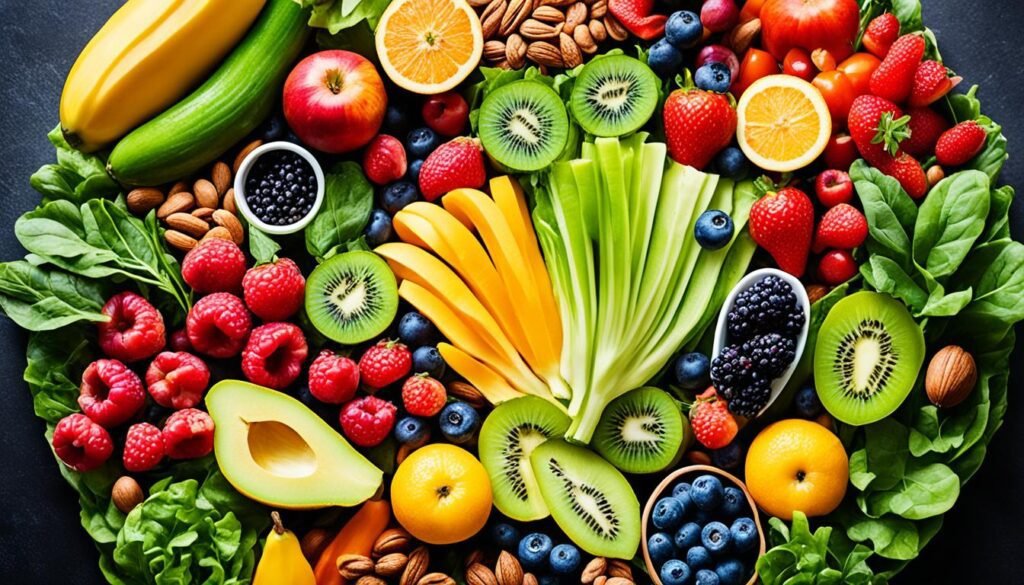
When it comes to achieving and maintaining healthy skin, it’s essential to nourish your body with key nutrients. These nutrients include essential vitamins, minerals, antioxidants, and fatty acids, all of which play a vital role in supporting optimal skin health.
Vitamins: One essential vitamin for healthy skin is Vitamin A. This vitamin is crucial for the health and maintenance of skin cells. You can find Vitamin A in low-fat dairy products such as milk and yogurt.
Antioxidants: Antioxidants are compounds that protect the skin from damage caused by harmful free radicals. Fruits and vegetables that are rich in antioxidants, such as berries, citrus fruits, and leafy greens, can help protect your skin cells and promote a healthy complexion.
Fatty Acids: Essential fatty acids are crucial for maintaining hydrated and youthful-looking skin. Foods rich in omega-3 fatty acids, such as fish, walnuts, and flaxseed oil, support healthy cell membranes and promote skin nourishment.
Minerals: Minerals like selenium and zinc are important for skin health. They can be found in foods such as Brazil nuts, sunflower seeds, and seafood. These minerals support various skin functions and contribute to overall skin nourishment.
By incorporating these key nutrients into your diet, you can provide your skin with the essential building blocks it needs to stay healthy, radiant, and vibrant.
| Key Nutrient | Food Sources |
|---|---|
| Vitamin A | Low-fat dairy products (milk, yogurt) |
| Antioxidants | Berries, citrus fruits, leafy greens |
| Fatty Acids | Fish, walnuts, flaxseed oil |
| Minerals | Brazil nuts, sunflower seeds, seafood |
Skin-Boosting Fruits
Certain fruits are particularly beneficial for skin health due to their high antioxidant content. Including a variety of fruits in the diet can contribute to a radiant and healthy complexion.
Berries
Berries, including blueberries, strawberries, and raspberries, are rich in antioxidants that protect skin cells from damage and contribute to a youthful appearance.
Oranges, Papaya, and Kiwi
Oranges, papaya, and kiwi are fruits high in vitamin C, which is essential for collagen production and overall skin health.
Tomatoes
Tomatoes, with their abundance of lycopene, help protect the skin from sun damage.
By incorporating these fruits with high antioxidant content into the diet, we can nourish our skin and unlock its full potential for a clear and healthy complexion.
| Fruit | Antioxidant Content | Skin-Enhancing Properties |
|---|---|---|
| Berries | High | Protect skin cells, promote a youthful appearance |
| Oranges, Papaya, Kiwi | High in Vitamin C | Essential for collagen production and overall skin health |
| Tomatoes | Abundance of lycopene | Protect skin from sun damage |
Nourishing Vegetables
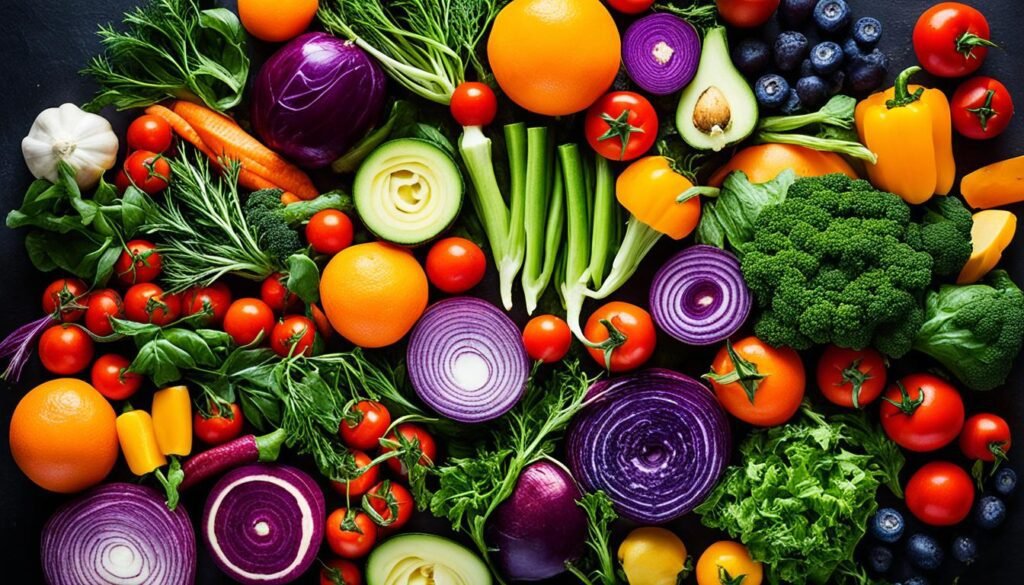
Like fruits, vegetables play a crucial role in maintaining a healthy skin diet. These nutrient-rich powerhouses provide essential vitamins, minerals, and antioxidants that promote skin health and contribute to a clear and radiant complexion.
Dark Leafy Greens
Dark leafy greens such as kale and spinach are excellent choices for enhancing skin health. They are packed with vitamins A, C, and E, as well as antioxidants that nourish the skin and protect against damage caused by free radicals. These vegetables support collagen production, maintain skin elasticity, and promote a vibrant and youthful-looking complexion.
Red and Yellow Bell Peppers
Incorporating red and yellow bell peppers into your diet can provide numerous benefits for your skin. These vibrant vegetables are rich in beta carotene and vitamin C, both of which play key roles in protecting the skin from harmful UV rays, stimulating collagen synthesis, and improving skin texture. Including bell peppers in your meals can help you achieve a healthy and glowing complexion.
Sweet Potatoes
Sweet potatoes are a delicious and nutritious addition to any skin-friendly diet. They are packed with vitamins A and C, both of which are essential for boosting skin cell renewal, reducing the appearance of wrinkles, and promoting a clear complexion. The high antioxidant content in sweet potatoes also aids in protecting the skin from damage caused by environmental factors.
Broccoli
Broccoli is a versatile vegetable that offers numerous benefits for skin health. It is a rich source of vitamins A and C, along with antioxidants that combat oxidative stress and promote overall skin health. Including broccoli in your meals can support collagen production, improve skin tone, and help maintain a youthful and healthy-looking complexion.
Tomatoes
Tomatoes are not only a tasty addition to meals but also a skin-friendly vegetable loaded with vitamins and antioxidants. The vibrant red color of tomatoes comes from an antioxidant called lycopene, which helps protect the skin from sun damage and maintains its natural glow. Tomatoes also provide other vital nutrients like vitamin C, which supports collagen synthesis and promotes a smooth and clear complexion.
By including a variety of vegetables, such as dark leafy greens, bell peppers, sweet potatoes, broccoli, and tomatoes, in your diet, you can provide your skin with the necessary nutrients for a clear and radiant complexion. These skin-friendly vegetables offer a wide range of vitamins, minerals, and antioxidants that nourish and protect the skin. So, make sure to incorporate these vegetables into your meals for optimal skin health.
Healthy Fats for Skin Nourishment
Incorporating healthy fats into your diet is crucial for nourishing your skin. These fats provide numerous benefits, promoting skin health and enhancing its appearance. Two types of healthy fats that play a significant role in skin nourishment are omega-3 fatty acids and monounsaturated fats.
The Benefits of Omega-3 Fatty Acids for Skin
Omega-3 fatty acids are essential fats that have anti-inflammatory properties, helping to reduce skin inflammation and sensitivity. They also support moisture retention, keeping the skin hydrated and supple. Incorporating foods rich in omega-3 fatty acids, such as fatty fish like salmon, mackerel, and sardines, into your diet can help improve the overall health and appearance of your skin.
The Role of Monounsaturated Fats in Skin Nourishment
Monounsaturated fats act as natural moisturizers for the skin, improving its elasticity and overall texture. These fats are found in foods like avocados, olive oil, and nuts. Adding these skin-nourishing foods to your diet can help maintain a hydrated and healthy-looking complexion.
By incorporating healthy fats into your daily meals, you provide your skin with the essential nutrients it needs for optimal health and vitality.
Hydration and Skin Health
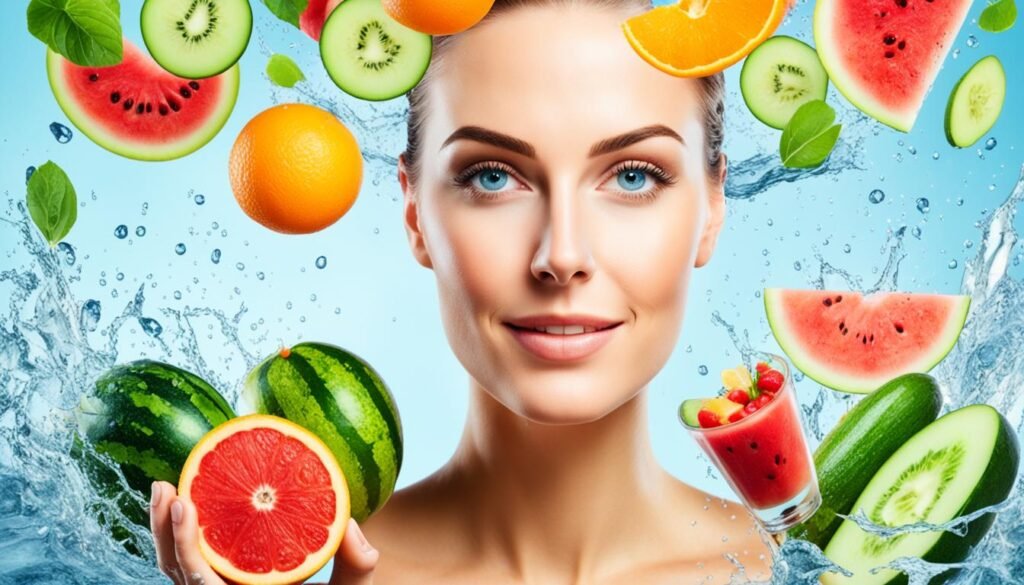
Staying hydrated is crucial for maintaining healthy skin. The importance of hydration for skin cannot be overstated. Water plays a vital role in maintaining skin moisture and keeping skin cells nourished. It helps flush out toxins from the body, promoting a clear and glowing complexion.
When you stay properly hydrated, your skin remains plump, appearing more youthful and vibrant. Dehydration, on the other hand, can lead to dryness, dullness, and an increased risk of wrinkles and fine lines.
Drinking enough water throughout the day is essential for maintaining optimal skin health. Experts recommend consuming at least eight glasses of water daily to ensure proper hydration and support skin’s overall well-being.
In addition to drinking water, incorporating fruits and vegetables with high water content into your diet can provide additional hydration for your skin. These include watermelon, cucumber, and citrus fruits, which not only hydrate but also provide essential vitamins and antioxidants to nourish your skin from within.
“Water helps to flush out toxins from the body and keeps skin cells hydrated and plump.”
“Proper hydration promotes efficient nutrient transport to the skin cells and aids in maintaining a youthful and clear complexion.”
Hydrating your skin is not only important for its appearance but also for its overall health. When your skin is well-hydrated, it functions properly, maintains elasticity, and acts as a barrier against environmental pollutants.
Hydration Tips for Healthy Skin
To maintain proper hydration, here are some tips to consider:
- Drink at least eight glasses of water per day.
- Carry a reusable water bottle with you throughout the day as a reminder to stay hydrated.
- Limit the consumption of dehydrating beverages like alcohol and excessive caffeine.
- Incorporate hydrating foods into your diet, such as fruits and vegetables with high water content.
- Use a moisturizer that suits your skin type to lock in hydration.
- Avoid excessive hot showers, as hot water can strip your skin of its natural oils and lead to dryness.
By following these hydration tips and maintaining a well-rounded skincare routine, you can support your skin’s hydration levels and promote its overall health and radiance.
The Impact of Diet on Common Skin Problems
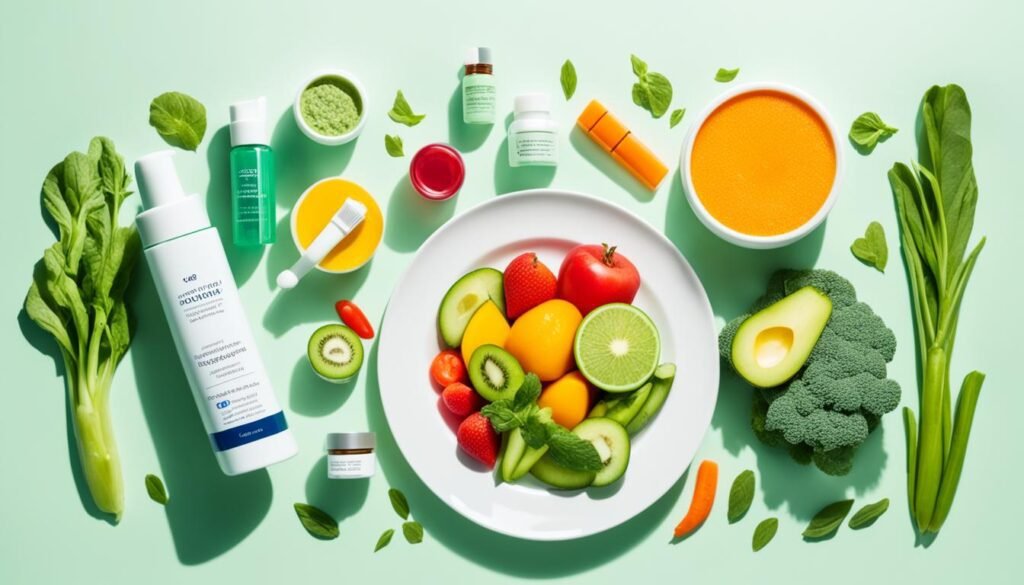
Diet plays a significant role in the development and management of common skin problems such as acne, psoriasis, and eczema. By making strategic dietary choices, you can potentially reduce the severity and frequency of these conditions.
Diet and Acne
Acne is a common skin condition characterized by the presence of pimples, whiteheads, and blackheads. While multiple factors contribute to acne development, diet can also play a role. To improve your skin’s condition and reduce the likelihood of breakouts, it’s important to focus on a diet that minimizes inflammation and supports overall skin health.
Key Dietary Considerations for Acne:
- Reduce the intake of saturated and hydrogenated fats, commonly found in high-fat dairy products, processed meats, and fried foods.
- Avoid consuming excessive amounts of refined sugars and processed carbohydrates, such as soda, candy, and white bread, which can contribute to inflammation in the body.
- Incorporate foods rich in antioxidants, such as berries, leafy greens, and colorful vegetables, which help combat inflammation and oxidative stress.
Diet and Psoriasis
Psoriasis is an autoimmune disease characterized by red, scaly patches on the skin. While diet alone cannot cure psoriasis, certain nutritional choices can help alleviate symptoms and promote overall skin health. Including specific nutrients and anti-inflammatory foods in your diet may help manage the condition.
Key Dietary Considerations for Psoriasis:
- Incorporate healthy fats, particularly omega-3 fatty acids found in fatty fish like salmon, mackerel, and sardines. These fats have anti-inflammatory properties that may reduce psoriasis symptoms.
- Add anti-inflammatory herbs and spices to your meals, such as turmeric, ginger, garlic, and cinnamon, which may further support the management of psoriasis.
- Ensure an adequate intake of fruits and vegetables rich in various vitamins, minerals, and antioxidants to support overall skin health.
Diet and Eczema
Eczema is a chronic inflammatory skin condition characterized by itchy, dry, and inflamed patches. While there is no one-size-fits-all diet for eczema, identifying and eliminating trigger foods can help manage the condition and reduce flare-ups.
Key Dietary Considerations for Eczema:
- Pay attention to potential food sensitivities by keeping a food diary and noting any symptoms that follow specific foods. Common trigger foods include dairy, gluten, eggs, and certain nuts.
- Reduce the intake of processed foods, additives, and preservatives, which may worsen eczema symptoms.
- Include foods rich in skin-protective nutrients, such as vitamins A, C, and E, zinc, and essential fatty acids, to support skin health and promote healing.
A balanced and nutritious diet that incorporates skin-friendly foods can play a crucial role in managing common skin problems. By making strategic dietary choices, you can potentially reduce the severity and frequency of acne, psoriasis, and eczema, leading to healthier and happier skin.
| Skin Problem | Dietary Recommendations |
|---|---|
| Acne | Reduce intake of saturated and hydrogenated fats Avoid refined sugars and processed carbohydrates Incorporate antioxidant-rich foods |
| Psoriasis | Incorporate foods rich in omega-3 fatty acids Add anti-inflammatory herbs and spices Ensure adequate intake of fruits and vegetables |
| Eczema | Identify and eliminate trigger foods Reduce intake of processed foods and additives Include skin-protective nutrients |
Conclusion
A healthy skin diet is vital for achieving and maintaining a clear and radiant complexion. By incorporating skin-boosting foods such as fruits, vegetables, healthy fats, and staying hydrated, we can nourish our skin from within and support optimal skin health. The importance of nutrition for a clear and radiant complexion cannot be overstated.
Nutrients like vitamins, minerals, antioxidants, and fatty acids play a significant role in promoting healthy skin and protecting against damage. A well-balanced diet rich in skin-friendly foods provides the necessary building blocks for healthy skin cells and collagen production. This not only improves the appearance of the skin but also safeguards it against common skin concerns such as dryness, acne, and premature aging.
Remember, what we eat becomes a part of our body, including our skin. By prioritizing skin-friendly nutrition and paying attention to our diet, we can unlock the potential for radiant and vibrant skin. Incorporate the recommended dietary guidelines, and you’ll be on your way to enhancing your skin’s health and achieving a clear and radiant complexion.
FAQ
What is the importance of a healthy skin diet?
A healthy skin diet is crucial for maintaining a clear and radiant complexion. Our diet directly impacts the health and appearance of our skin. Consuming nutritious foods nourishes the skin from within and promotes optimal skin health.
What are the key nutrients for healthy skin?
The key nutrients for healthy skin include vitamins, minerals, antioxidants, and fatty acids. These nutrients support skin health, protect against damage, and promote a youthful appearance.
How do fruits contribute to skin health?
Fruits, especially those high in antioxidants, help protect skin cells from damage and promote a youthful appearance. Berries, citrus fruits, and tropical fruits are particularly beneficial for the skin.
How do vegetables promote healthy skin?
Vegetables provide essential vitamins, minerals, and antioxidants that support skin health and radiance. Dark leafy greens, peppers, sweet potatoes, broccoli, and tomatoes are some skin-boosting vegetables.
What are the healthy fats that nourish the skin?
Healthy fats such as omega-3 fatty acids, found in fatty fish, and monounsaturated fats, present in avocados and olive oil, support skin nourishment, hydration, and elasticity.
How does hydration impact skin health?
Staying hydrated is essential for maintaining healthy skin. Water keeps skin cells hydrated, flushes out toxins, and promotes a clear and youthful complexion. Including water-rich foods can also contribute to overall hydration.
Can diet impact common skin problems?
Yes, a healthy skin diet can have a significant impact on skin problems like acne, psoriasis, and eczema. Reducing the intake of certain foods and including skin-friendly nutrients can help manage and improve these conditions.
What is the conclusion on a healthy skin diet?
A healthy skin diet is essential for maintaining a clear and radiant complexion. By incorporating skin-boosting foods, key nutrients, and staying hydrated, we can nourish our skin from within and support optimal skin health.

